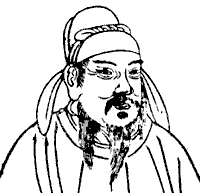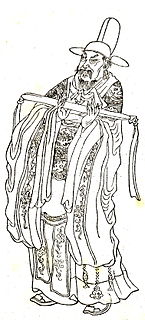During Liu Bin's and Liu Sheng's reigns
By 942, when Liu Honggao's older brother Liu Bin (né Liu Hongdu, Emperor Shang) was emperor, a group of agrarians, believed that a god had foreordained that Zhang Yuxian, a lowly county administrator at Bolo County (博羅, in modern Huizhou, Guangdong), was to be their ruler, rose against Southern Han rule. Liu Bin sent Liu Honggao's older brother Liu Hongchang the Prince of Yue to command the army against Zhang, with Liu Honggao serving as his deputy. However, Liu Hongchang and Liu Honggao were defeated and surrounded by Zhang's agrarian army. They escaped capture only due to the efforts of the officer Chen Daoxiang (陳道庠). Much of the eastern part of the Southern Han realm was captured by Zhang's army. [3]
Liu Bin (劉玢), né Liu Hongdu (劉弘度), may be nicknamed Shou (壽), formally Emperor Shang of (Southern) Han ( 漢殤帝), was the second emperor of the Chinese Five Dynasties and Ten Kingdoms Period state Southern Han. He reigned only briefly, from 942 to 943, from the time of the death of his father Liu Yan to the time he was assassinated in a coup headed by his brother Liu Hongxi.
Zhang Yuxian (張遇賢), with the self-claimed title of "King of the Eight Kingdoms of Middle Heaven" (中天八國王), was an agrarian/religious rebel leader of the Chinese Five Dynasties and Ten Kingdoms Period, who first rose against Southern Han and whose forces eventually battled and were defeated by the armies of Southern Han's northern neighbor Southern Tang. After his defeat, his general Li Tai (李台) arrested him and delivered him to the Southern Tang army to be executed.

Huìzhōu is a city in southeast Guangdong Province, China. It forms part of the Pearl River Delta megalopolis. Huizhou borders the provincial capital of Guangzhou to the west, Shenzhen and Dongguan to the southwest, Shaoguan to the north, Heyuan to the northeast, Shanwei to the east, and Daya Bay of the South China Sea to the south. The city has about 4.6 million inhabitants and is administered as a prefecture-level city.
Liu Bin was arrogant and licentious, and he ignored advice from Liu Hongchang and the eunuch Wu Huai'en (吳懷恩), both of whom tried to change his behavior. Another brother, Liu Hongxi the Prince of Qin, was plotting to take over the state, and therefore encouraged Liu Bin's behavior. As Liu Bin favored arm wrestling, Liu Hongdu had Chen train five arm wrestlers to wrestle with Liu Bin. In 943, one night, when Liu Bin was drunk, Chen and the arm wrestlers, at Liu Hongxi's order, killed Liu Bin and his attendants. The next morning, the princes and the officials, realizing that Liu Bin had been killed, were initially not daring to enter the palace. Liu Hongchang led his younger brothers in welcoming Liu Hongxi to the palace and offering the throne to him. Liu Hongxi then took the throne (as Emperor Zhongzong) (and changed his name to Liu Sheng). [3]
Liu Sheng made Liu Hongchang a chancellor, giving him the titles of Taiwei (太尉), Zhongshu Ling (中書令), and generalissimo of the armies of all circuits. Liu Honggao was also made a chancellor and deputy generalissimo. [3]
After Liu Sheng took the throne, however, there were continuous rumors throughout the realm about how Liu Bin died. Liu Honggao suggested to Liu Sheng that he kill the arm wrestlers involved in the assassinations to quell the discontent. Liu Sheng did not agree, and the arm wrestlers, who were well-rewarded by Liu Sheng for assassinating Liu Bin, heard of Liu Honggao's suggestion, and in turn falsely accused him of treason. Liu Sheng sent two of the arm wrestlers, Liu Sichao (劉思潮) and Tan Lingyin (譚令禋), to lead soldiers against Liu Honggao. Liu Sichao and Tan headed to Liu Honggao's mansion and killed him as he was holding a feast. It was said that after this incident, Liu Sheng considered killing all of his brothers, which he eventually did. [3] (Another account of Liu Honggao's death indicated that Liu Sheng sent a messenger to his mansion to summon him, and that he, knowing that death was coming, bathed and prayed before reporting to Liu Sheng's palace, where he was ordered to commit suicide.) [1]

Emperor Zhongzong of Tang, personal name Li Xian, and at other times Li Zhe or Wu Xian, was the fourth Emperor of the Tang dynasty of China, ruling briefly in 684 and again from 705 to 710.

Emperor Daizong of Tang, personal name Li Yu, né Li Chu (李俶), was an emperor of the Chinese Tang Dynasty.

Emperor Ruizong of Tang, personal name Li Dan, also known at times during his life as Li Xulun, Li Lun, Wu Lun, and Wu Dan, was the fifth and ninth emperor of Tang Dynasty. He was the eighth son of Emperor Gaozong and the fourth son of Emperor Gaozong's second wife Empress Wu.
Liu Jingxian (劉景先), né Liu Qixian (劉齊賢), was an official of the Chinese dynasty Tang Dynasty, serving as chancellor late in the reign of Emperor Gaozong and the subsequent regency of Emperor Gaozong's wife Empress Dowager Wu over their sons Emperor Zhongzong and Emperor Ruizong. In 684, he offended Empress Dowager Wu by defending fellow chancellor Pei Yan against charges of treason and was arrested and then exiled. He was rearrested in 689 and committed suicide by hanging.

Zhang Xun was a general of the Chinese Tang Dynasty. He was known for defending Yongqiu and Suiyang during the An Shi Rebellion against the rebel armies of Yan, and thus, his supporters asserted, he blocked Yan forces from attacking and capturing the fertile Tang territory south of the Huai River. However, he was severely criticized by some contemporaries and some later historians as lacking humanity due to his encouragement of cannibalism during the Battle of Suiyang. Other historians praised him for his great faithfulness to Tang.
Li Chongrun, né Li Chongzhao, formally Crown Prince Yide, was an imperial prince of the Tang Dynasty and Wu Zetian's Zhou Dynasty. He was the only son of Emperor Zhongzong and Emperor Zhongzong's second wife Empress Wei. In 701, he offended his grandmother Wu Zetian by discussing Wu Zetian's lovers Zhang Yizhi and Zhang Changzong with his sister Li Xianhui the Lady Yongtai and her husband Wu Yanji (武延基) the Prince of Wei, and he, along with Li Xianhui and Wu Yanji, were forced to commit suicide. He was posthumously honored as crown prince after his father Emperor Zhongzong was restored to the throne in 705 and in 706, Emperor Zhongzong provided Li Chongrun with an honorable burial by interring his remains at the Qianling Mausoleum.
Wei Sili, courtesy name Yan'gou (延構), formally Duke Xiao of Xiaoyao (逍遙孝公), was an official of the Chinese dynasty Tang Dynasty and Wu Zetian's Zhou Dynasty, serving as a chancellor during the reigns of Wu Zetian, her sons Emperor Zhongzong and Emperor Ruizong, and her grandson Emperor Shang.
Liu Youqiu (劉幽求), formally Duke Wenxian of Xu (徐文獻公), was an official of the Chinese dynasty Tang Dynasty and Wu Zetian's Zhou Dynasty, serving as a chancellor during the reigns of Emperor Ruizong and Emperor Xuanzong.
Li Mian, courtesy name Xuanqing (玄卿), formally Duke Zhenjian of Qian (汧貞簡公), was an official and general of the Chinese dynasty Tang Dynasty, serving as a chancellor during the reign of Emperor Dezong.
Zhang Quanyi (張全義), né Zhang Juyan (張居言) or Zhang Yan (張言), known as Zhang Zongshi (張宗奭) during Later Liang, courtesy name Guowei (國維), formally Prince Zhongsu of Qi (齊忠肅王), was a late Chinese dynasty Tang Dynasty warlord who later was a senior official during the succeeding Later Liang and Later Tang. He was credited for rebuilding the city of Luoyang from utter destruction from the warfares in the late Tang period into a prosperous city.
Liu Xun (劉鄩) was a major general of the Chinese Five Dynasties and Ten Kingdoms period state Later Liang. He was a key commander of Later Liang forces in its struggle with its archenemy Jin, but, after repeated defeats by the Jin prince Li Cunxu, Liu sought retirement, and was subsequently poisoned to death by the Later Liang emperor Zhu Zhen, who doubted his loyalty.
Empress Ma was the only known empress of the Chinese Five Dynasties and Ten Kingdoms period state Southern Han. She was the wife of Southern Han's founding emperor Liu Yan, and the daughter of Ma Yin, the prince of Southern Han's northern neighbor Chu.
Consort Dowager Zhao was the mother of Liu Bin, the second emperor of the Chinese Five Dynasties and Ten Kingdoms period state Southern Han. She was a concubine to Liu Bin's father, the founding emperor Liu Yan.
Zhang Juhan (張居翰) (858-928), courtesy name Deqing (德卿), was a senior eunuch of the Chinese Five Dynasties and Ten Kingdoms period state Later Tang, serving as a chief of staff for Later Tang's founding emperor Li Cunxu.
Liu Hongchang (劉弘昌), formally the Prince of Yue (越王), was an imperial prince and chancellor of the Chinese Five Dynasties and Ten Kingdoms Period state Southern Han. He was a son of Southern Han's founding emperor Liu Yan, and at one point, Liu Yan considered bypassing his older brothers Liu Bin and Liu Sheng and making him the successor to the throne. During the subsequent reign of Liu Sheng, Liu Sheng, fearing his capability, had him assassinated.
Chen Wo (陳偓) was an official of the Chinese Five Dynasties and Ten Kingdoms Period state Southern Han, serving as a chancellor during the reign of its third emperor Liu Sheng.






